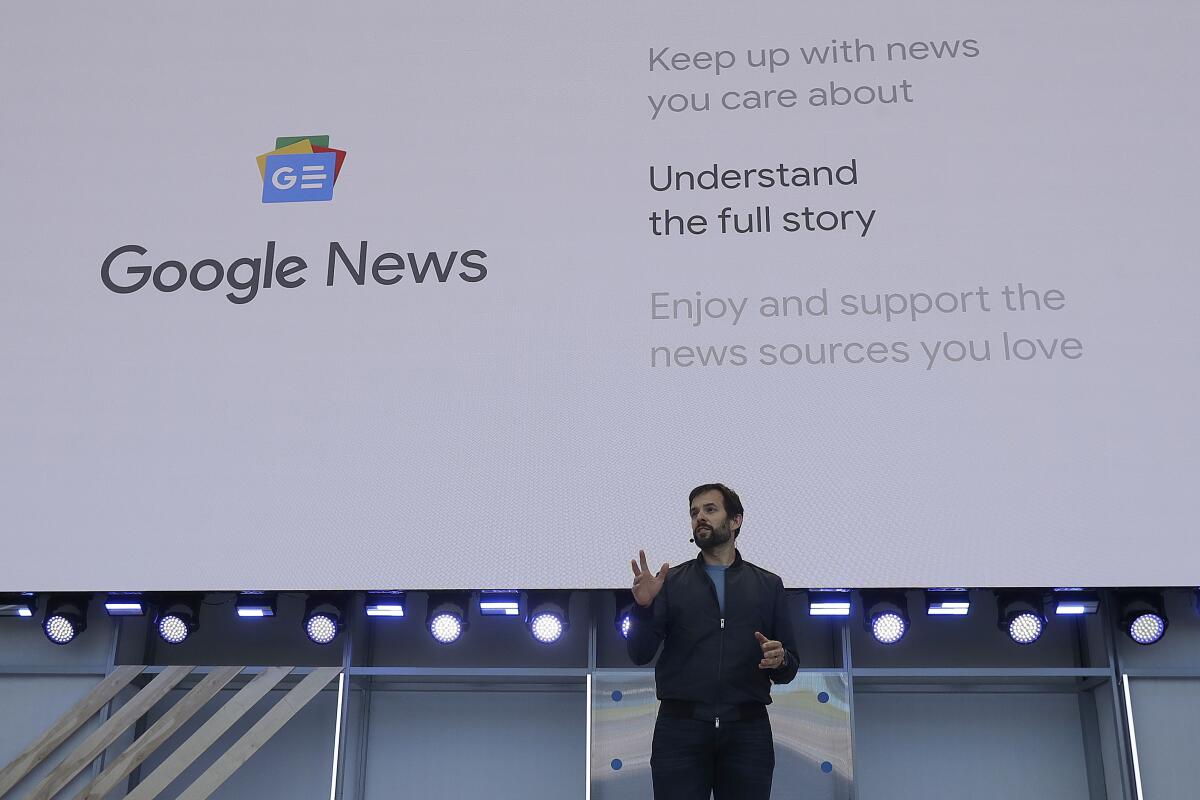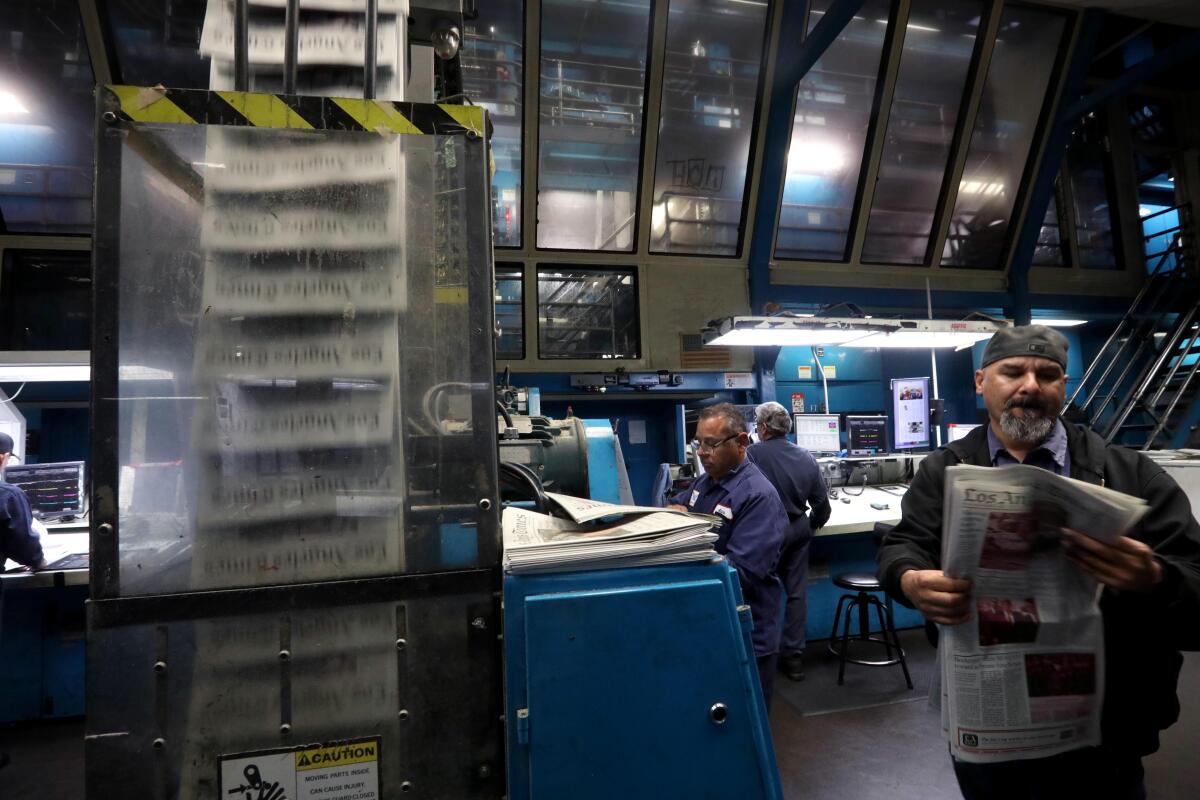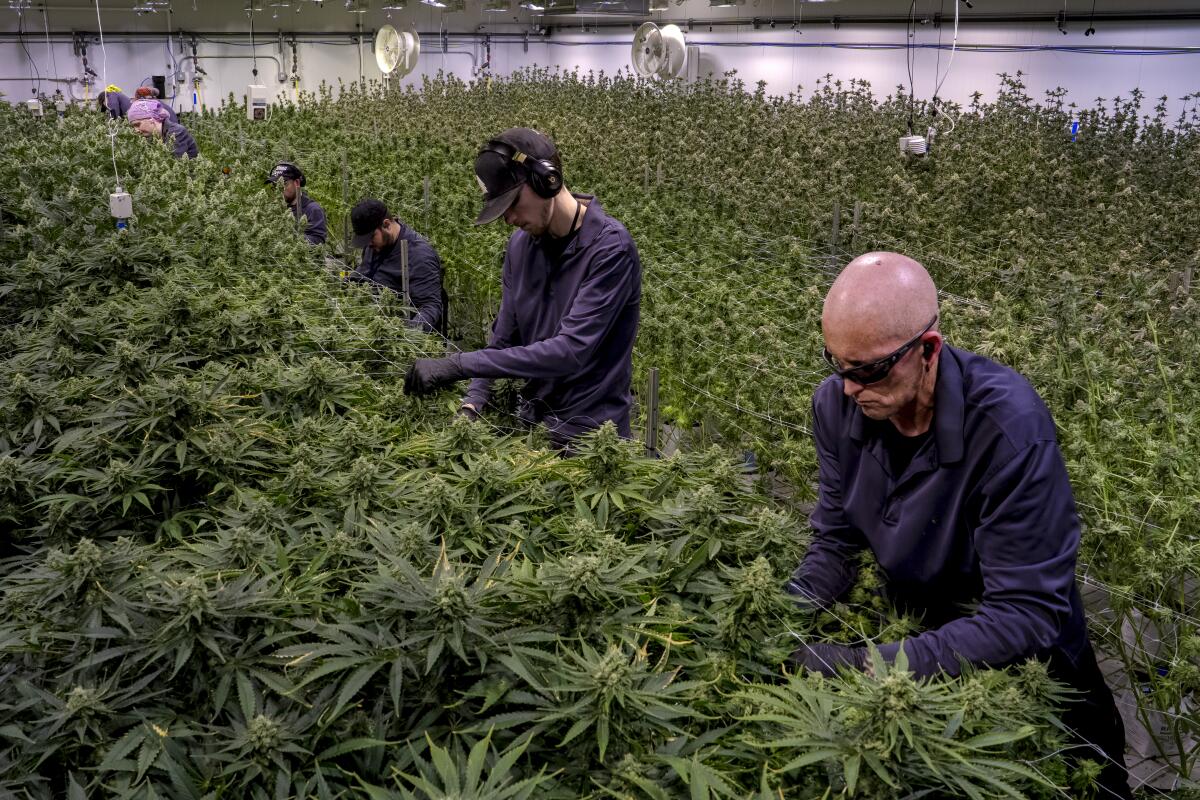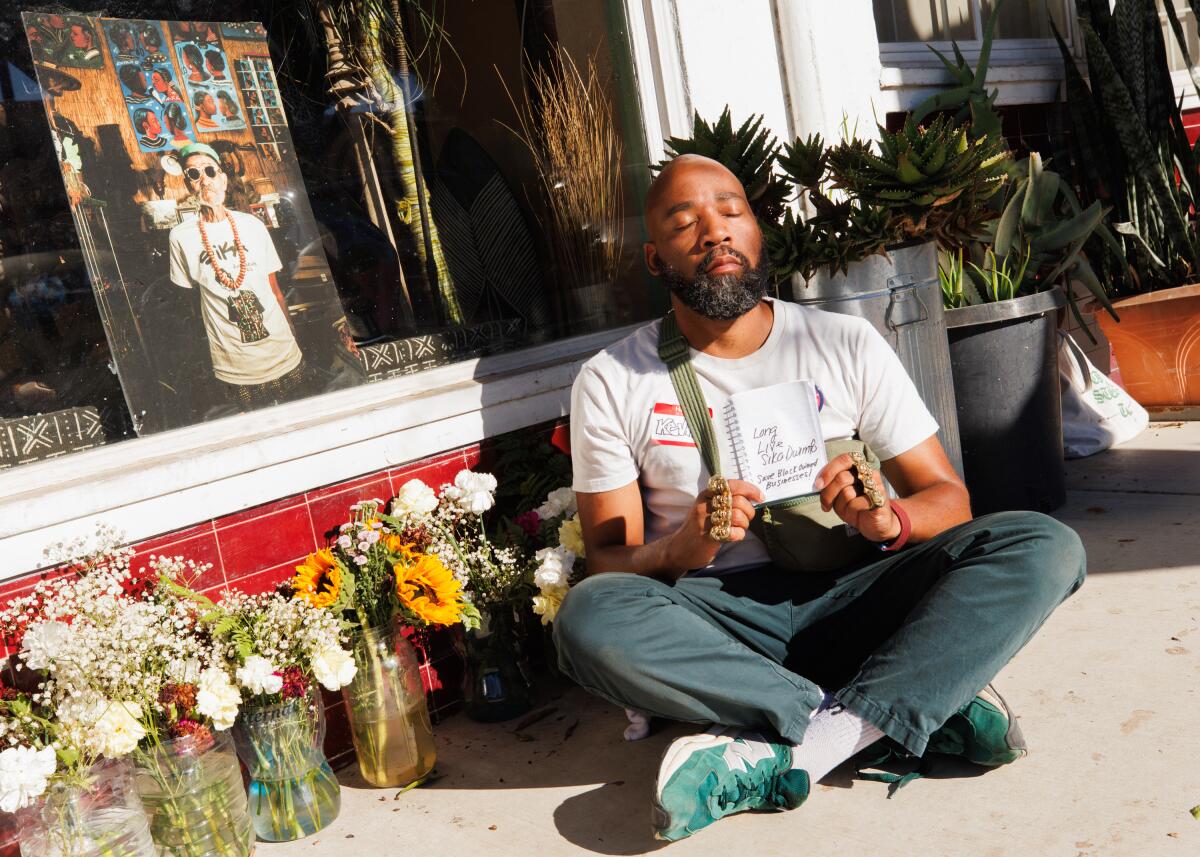California struck a deal with Google to fund local journalism. Journalists aren’t happy about it

- Share via
Good morning. It’s Friday, Aug. 30. Here’s what you need to know to start your day.
- Why journalists aren’t fans of the deal California struck with Google.
- Michigan surpassed California as the largest cannabis market in the country.
- How to choose the best Hollywood studio tour for you.
- And here’s today’s e-newspaper
You're reading the Essential California newsletter
Our reporters guide you through our biggest news, features and recommendations every morning
You may occasionally receive promotional content from the Los Angeles Times.
Google and California reach agreement on funding newsrooms. Is it enough?
A state bill with bipartisan support that aimed to throw a lifeline to California’s struggling news industry is no more.
In place of the proposed “journalism usage fee” levied on Google and Meta annually to help fund local newsrooms, state officials announced a nearly $250-million public-private partnership wherein Google would pay a fraction of what they might have owed under the proposed law.
The agreement would also put state taxpayers on the hook for tens of millions. Meta, which owns Facebook and Instagram, is not part of the deal and state lawmakers are not currently pursuing one with them.
The proposed deal has torn wider the rift between lawmakers, legacy publishers, smaller digital outlets and the labor groups that represent the state’s journalists, which called the outcome a “shakedown.”

What happened?
The California Journalism Preservation Act, introduced last year by Assemblymember Buffy Wicks (D-Oakland), received wide support in the state legislature and was modeled off similar fee structures developed in Australia and Canada.
Supporters pointed to the “vise grip” the tech giants have on digital advertising, arguing that Google and Meta swallowed up billions in ad revenue many publications rely on to fund their journalism.
State Sen. Steve Glazer introduced a related proposal this year, seeking to charge Big Tech a “data extraction mitigation fee” that would fund tax credits for news organizations to hire more reporters.
Full transparency: Clearly I and fellow L.A. Times journalists have a stake in these efforts. Our unit is part of the Media Guild of the West, which represents hundreds of state news workers and endorsed both bills.
Meta and Google opposed the bills, funding a major ad campaign (you may have seen it during the Olympics) and threatening to pull news content from their platforms. Meta actually did that in Canada rather than pay news organizations.
Wicks told me uncertainty had grown in recent weeks about whether Gov. Gavin Newsom would sign her bill. She also worried it could face years of legal challenges. She said her options were: “this or nothing.”
“From my perspective, this deal that we landed is the largest deal that we were going to get for today,” she said.
What’s in the deal?
The state would establish a nonprofit News Transformation Fund, to be administered by UC Berkeley’s School of Journalism.
Google would pitch in nearly $173 million over five years, according to a framework document shared by Wicks’ office. But the majority of the company’s contributions would not go directly to fund local newsrooms.
Under the five-year framework, Google would pay:
- $55 million into the journalism fund, $15 million of that in the first year
- A separate $50 million to boost funding for the company’s existing journalism programs
- Google would also funnel nearly $68 million into a separate fund for artificial intelligence research, including a “National AI Accelerator.”
Details of that AI research are vague and were not part of Wicks’ initial bill. She said the goal would be to “create tools that actually help and augment [but] not replace or replicate journalism.”
California (aka taxpayers) would pay $70 million into the journalism fund — $30 million in 2025 and $10 million each of the following four years — into the journalism fund. No public dollars will go toward AI development, Wicks emphasized. The framework states that investments could increase based on available state and private funds.
The agreement is not a tax on Google, has no enforcement mechanism and only outlines funding for five years. And it appears Google’s contributions to the journalism fund would be tax deductible, according to Wick’s office.
In contrast, Canada’s government passed a law last year under which Google agreed to pay news organizations there $74 million U.S. dollars every year, with no term limit.
Sen. Glazer released a statement calling Google’s contributions “completely inadequate” and said the agreement “seriously undercuts our work toward a long term solution to rescue independent journalism.”
‘A huge missed opportunity’
While Wicks, Newsom, Google executives and the state’s publishing lobby lauded the agreement, many organizations that represent California journalists are not happy.
Media Guild of the West blasted the agreement, saying worker groups were cut out of an “undemocratic and secretive deal.”
“The future of journalism should not be decided in backroom deals,” media labor leaders wrote in a joint letter to state lawmakers. “The Legislature embarked on an effort to regulate monopolies and failed terribly. Now we question whether the state has done more harm than good.”
Wicks did not address why news workers unions were not involved in the final deal, but contended the California News Publishers Association is the key player in state policy related to publishing issues and was best positioned to negotiate with Google.
For tech writer Brian Merchant, the deal “represents a huge missed opportunity to meaningfully claw back some of the power that tech monopolies like Google and Facebook have solidified over our information ecosystem.”
Merchant is a former columnist for The Times and author of “Blood in the Machine,” which chronicles the 19th century Luddite movement and traces it to the growing pushback on Big Tech today (he also writes a newsletter by the same name).
He pinned the fate of Wicks’ bill on Newsom’s “cold political calculus.”
“Google is a major power broker in Silicon Valley and in California, and Gavin Newsom did not want to pick a fight with them at this point in time,” Merchant said. “He would rather not alienate … Silicon Valley and its prospective donor base than come out swinging to try to save California’s news industry.”

What will this mean for the state’s struggling newsrooms?
The deal still needs to be approved by the state legislature and there are a lot of unknowns — including how much money each news publication would receive through the distribution formula outlined in the deal.
Wicks called the agreement “a down payment” and expressed hope that it represents “the floor, not the ceiling” in an ongoing effort to get Big Tech to pay news publishers their fair share.
But Merchant believes the “toothless deal” won’t achieve anything meaningful, other than “continuing the race to the bottom that these tech companies set in motion.”
“Google is going to continue to capture an outsized share of the ad market, buffeted by the work that human creators produce,” he said. “It will put more AI in play that could potentially serve as a direct competitor to some of the remaining journalists out there, lowering the quality of actual human-collected news.”
This all comes as the industry continues a decades-long decline, with fewer reporters in hollowed-out newsrooms as subscriptions and web traffic dip. When communities don’t have rigorous news media keeping tabs on people with power, corruption and misinformation can flourish. Residents — often marginalized to begin with — are the ones who pay the price.
The best way to support the local journalism that you value is with a paid subscription or donation. Maybe that’s The Times or maybe it’s one of the hundreds of other print and digital publications across the state that help you understand the challenges and triumphs of your community and the forces that shape it.
Today’s top stories

Michigan surpassed California as the largest cannabis market in the country
- The Golden State still clocks significantly higher sales by dollar amount. But when it comes to the sheer number of cannabis products sold, Michigan’s had a surprisingly swift trip to the top.
- Industry experts said California’s weed market is underperforming because of competition from illicit operators, steep taxes and what many growers and businesses describe as overly restrictive regulations.
- Meanwhile, California lawmakers passed a bill allowing Amsterdam-style cannabis cafes. Gov. Gavin Newsom vetoed a nearly identical version of the bill last year.
Takeaways from Harris and Walz’s first interview
- In her first major interview since becoming the Democratic nominee, Vice President Kamala Harris promised to appoint a Republican to her Cabinet if she is elected. Presidents often do this, but it seldom amounts to a true team of rivals.
- Thursday’s interview with Dana Bash of CNN provided more evidence of Harris’ turn toward the center — both in tone and in policy — in the month-plus since she was elevated to the top of the ticket.
The new COVID vaccine is here. Should you roll up your sleeve now or later?
- The CDC said September and October are generally the best times for most people to get a COVID shot, though there are other factors to consider.
- Seniors, immunocompromised people and those concerned about long COVID should get the new vaccination as soon as possible, health experts said.
More big stories
- Los Angeles will receive $21.8 million in federal money to help shelter migrants.
- Students across several Bay Area universities held coordinated pro-Palestinian rallies that were impassioned but adhered to zero-tolerance regulations.
- Two guns were found at LAUSD high schools, bringing the total to four in the first month of the new academic year.
- Los Angeles unveiled a reparations report on the experiences of Black residents since 1925.
- This Labor Day weekend is expected to be one of the busiest in travel history, closing out a record-breaking summer.
Get unlimited access to the Los Angeles Times. Subscribe here.
Commentary and opinions
- The Clippers arena may be allowed to serve alcohol till 4 a.m. State lawmakers should serve up the same deal for bars, restaurants and nightclubs, The Times Editorial Board argues.
- Trump asks why Harris hasn’t done all she’s promised. It’s because she’s VICE president, Mark Z. Barabak writes.
- The LAPD needs a chief who can turn around the department and restore public confidence, The Times Editorial Board writes.
- With a conference on the pandemic, Stanford gives purveyors of misinformation and disinformation a platform, Michael Hiltzik writes.
Today’s great read
Silent boy summer: Three months, no talking. Here’s how — and why — one L.A. resident did it. Vows of silence tend to conjure images of monks meditating in the mountains. But Kevito Clark added a modern-day twist to the practice.
How can we make this newsletter more useful? Send comments to essentialcalifornia@latimes.com.
For your downtime
Going out
- 🎞️ There’s a movie studio tour for every type of Angeleno, whether you’re a seeker of movie trivia, cinematic magic or that perfect Central Perk selfie.
- 🖼️ Here’s a busy person’s guide to PST, the Olympics of art for Southern California that begins next month.
- 🎵 An upcoming revival of the Green Day musical “American Idiot” features deaf actors and is performed simultaneously in spoken English and American Sign Language.
- 🎭 Here are the hottest tickets in L.A. theater, classical music and more this fall.
Staying in
- 🎤 Next year’s Oscars have a surprising original song contender: Kristen Wiig.
- 🏈 Here are five things to watch as the DeShaun Foster era begins when UCLA faces Hawaii on Saturday.
- 📺 If you’re a parent, Lauren Greenfield’s new doc about teens and social media ‘“is a horror movie.”
- ▶️ Nearly 30 years after “7th Heaven” premiered, three of its former child stars are sharing memories and wrestling with its legacy on their podcast “Catching Up With the Camdens.”
- 🧑🍳 Here’s a recipe for matzoh balls.
- ✏️ Get our free daily crossword puzzle, sudoku, word search and arcade games.
And finally ... a great photo
Show us your favorite place in California! Send us photos that scream California and we may feature them in an edition of Essential California.
Today’s great photo is from Kit Bellamy of South Pasadena: the June Lake Loop, a “true gem of California” that includes four alpine lakes. Kit writes the above photo features her sister-in-law floating in Gull Lake, which is “ideal for canoeing, kayaking and paddleboarding.”
Kit writes: “The sunset was beyond beautiful that evening, and we lingered on the lake until dark, savoring the sunset and views of the Eastern Sierra Nevada.”
Have a great day, from the Essential California team
Ryan Fonseca, reporter
Defne Karabatur, fellow
Andrew Campa, Sunday reporter
Hunter Clauss, multiplatform editor
Christian Orozco, assistant editor
Stephanie Chavez, deputy metro editor
Karim Doumar, head of newsletters
Check our top stories, topics and the latest articles on latimes.com.
Sign up for Essential California
The most important California stories and recommendations in your inbox every morning.
You may occasionally receive promotional content from the Los Angeles Times.









